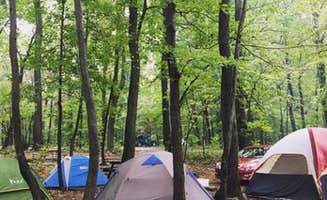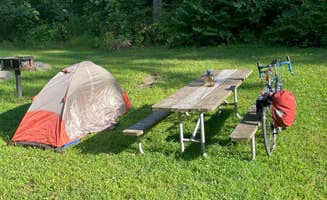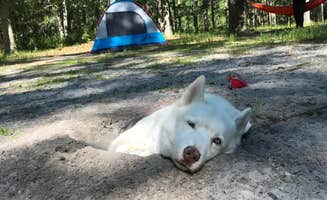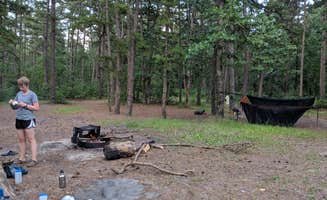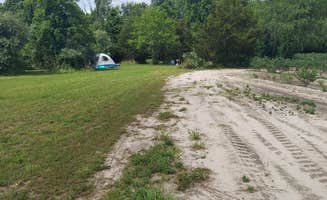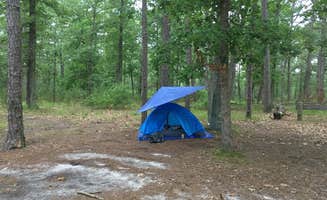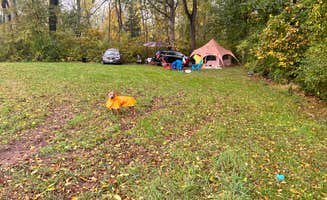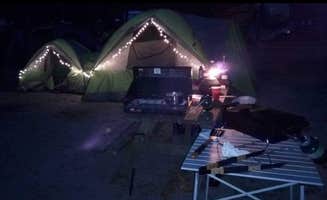Camping options around Huntingdon Valley, Pennsylvania concentrate primarily on primitive group sites within suburban park settings. Many require substantial hiking to reach, with several located on uneven terrain at elevations between 200-400 feet. Most locations enforce specific residency requirements or group-only policies, creating barriers for individual campers seeking accessible tent sites within 30 miles of Philadelphia's northeastern suburbs.
What to do
Birdwatching at Fort Washington State Park: The park features observation decks where visitors can spot various bird species including raptors during migration seasons. Fort Washington State Park offers "Over 3.5 miles of trails leading to Hawk Watch observation decks, which birders will marvel at and the rest of us will simply appreciate the vista," according to Stuart K.
Creek exploration at Evansburg State Park: This location provides access to small waterways perfect for wading during warmer months. According to Chuck C., "this hidden gem of a campground is beautiful. There is plenty of hiking trails. Only downside is having to haul gear by foot to the campsite." Meg F. adds that Green Lane Park has "clear and beautiful water" that enhances the hiking experience.
Primitive camping at Round Valley Recreation Area: For serious backpackers seeking tent camping near Huntingdon Valley, this site requires significant effort but rewards with seclusion. "This is a great campground that is super private and quiet - great for getting out to enjoy the sights and sounds of nature. It's a pretty strenuous hike, but you'll be rewarded for the effort!" writes Agbi B. about Round Valley State Park.
What campers like
Group camping accommodations: Most tent sites around Huntingdon Valley accommodate organized groups rather than individual campers. At Ridley Creek State Park, "I love camping at Ridley creek. Very peaceful," notes Chuck C. Sue C. explains that Fort Washington offers "group camping by reservation only, not nightly camping for individuals."
Natural water features: Streams and small lakes enhance many camping areas. According to Riley K. at Round Valley, "Well maintained campsites. Fire pit had a medal grate to cook on. Beautiful area. We paddled in, the water is very clean and crystal clear." For unique water access, Bobby S. recommends Tinicum Island, stating it's "A great place to stay if you have a watercraft."
Escape from suburban surroundings: Despite proximity to developed areas, most tent sites offer surprising isolation. Jnear139 describes Boulder Ridge Farm as "Great place to escape the stress of every day life. Plenty of fire wood, really cool huge rocks and waking up to owls was awesome."
What you should know
Residency requirements: Several campgrounds restrict camping to local residents only. Les R. noted about Alverthorpe Private Park: "Restricted to only residents. Looks nice, if you can actually stay here."
Limited amenities: Most tent camping sites offer bare necessities. At Wharton State Forest Batona Campground, meghan G. explains: "Bathrooms are very basic. Fresh water pump is located at entrance to campground. Each campsite is a cleared area with a fire pit."
Challenging access routes: Many sites require physical effort to reach. Stuart K. describes Round Valley's access: "I have hiked throughout the entire US and consider myself somewhere between a moderate to skilled hiker and I found these trails challenging and uneven, so while the hike we made was only 3 miles, it was not easy."
Tips for camping with families
Choose more developed sites: Some parks offer better infrastructure for children. At Deep Creek Campground, Joe B. notes: "Beautiful campground. Clean restrooms, lots of open space!" This makes it easier for families with younger children.
Look for educational opportunities: Several parks feature historical elements kids can explore. As Sarah L. describes Fort Washington: "It's almost 500 acres filled with trails, woods, and river. I usually go to the parking right off of Militia hill rd. and Skippack Pike intersection. It's an easy walk to the river trail and dogs are allowed everywhere."
Plan for minimal facilities: Basic restrooms and limited water access mean preparation is important. Tara T. points out about Green Lane: "The spaces are right on top of each other with no tree cover between spots, so you'll definitely be right up on your neighbors. The fire rings are big and frustrating, the fire sits on a lifted grate so you go through wood like crazy."
Tips for RVers
Limited RV options: Most tent camping near Huntingdon Valley doesn't accommodate large vehicles. Tiffany B. describes Green Lane Park as "Campground is as basic as they get. Sites are close to each other with absolutely no privacy. Bathrooms however are nice and clean with plenty of them around the park."
Group facilities only: RVers should check if their group qualifies for specialized sites. Kerri D. noted about Fort Washington: "There's at least two fire pits per camp ground. There's only group camping. The give you firewood—-if you bring your own, leave with any left over."
Seasonal restrictions: Many campgrounds close during winter months. Brittany L. explains about Batona Campground: "The closest ranger station for checking in and purchasing wood is about a 20 minute drive," which means planning ahead for supplies is essential, especially during limited seasonal hours.


